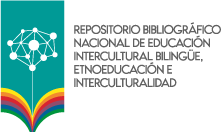Por favor, use este identificador para citar o enlazar este ítem:
http://repositoriointerculturalidad.ec/jspui/handle/123456789/4155Registro completo de metadatos
| Campo DC | Valor | Lengua/Idioma |
|---|---|---|
| dc.contributor.advisor | Montaluisa Chasiquiza, Luis Octavio | - |
| dc.contributor.author | Pujota Cabascango, Carmen Aida | - |
| dc.date.accessioned | 2018-07-31T20:30:07Z | - |
| dc.date.accessioned | 2020-04-29T17:05:00Z | - |
| dc.date.accessioned | 2020-05-04T03:26:34Z | - |
| dc.date.available | 2018-07-31T20:30:07Z | - |
| dc.date.available | 2020-04-29T17:05:00Z | - |
| dc.date.available | 2020-05-04T03:26:34Z | - |
| dc.date.issued | 2018-07 | - |
| dc.identifier.other | http://dspace.ups.edu.ec/handle/123456789/15841 | - |
| dc.identifier.uri | http://8.242.217.84:8080/xmlui/handle/123456789/4155 | - |
| dc.description | The research work is aimed at determining the vitality of the Kichwa language in the Chaupiloma community, located in the province of Pichincha. The socio historical context of the community is taken into consideration. The background of the research, the linguistic and sociolinguistic concepts related to the subject are reviewed. Then, with the methodology for the case study, the data is collected to study the situation of the Kichwa in the different levels of the community. Once all the necessary information has been collected and, according to the analysis of all the compiled data, it can be concluded that there is an average assessment of the Kichwa language in this community. The majority of members of the community are in favor of a bilingual school and that children speak Kichwa. However, there is a percentage of families that would prefer to be taught English. They think that to learn English, the Kichwa must be forgotten. Information is needed that knowing first Kichwa as their own language and Spanish would make it easier for them to learn any other language such as English. | en_US |
| dc.description.abstract | El trabajo de investigación está destinado a determinar la vitalidad de la lengua kichwa en la comunidad Chaupiloma, ubicada en la provincia de Pichincha. Se toma en consideración el contexto socio-histórico de la comunidad. Se revisan los antecedentes de la investigación, los conceptos lingüísticos y sociolingüísticos relacionados con el tema. Luego, con la metodología para el estudio de caso, se recolecta los datos para estudiar la situación del kichwa en los diferentes estamentos de la comunidad. Una vez recopilada toda la información necesaria y, de acuerdo con el análisis de todos los datos compilados se puede concluir que hay una valoración media de la lengua kichwa en esta comunidad. La mayoría de miembros de la comunidad está a favor de que exista una escuela bilingüe y que los niños hablen el kichwa. Sin embargo, hay un porcentaje de familias que preferirían que se enseñe el inglés. Piensan que para aprender el inglés debe olvidarse el kichwa. Hace falta información de que el saber primero kichwa como idioma propio y el castellano les facilitaría aprender cualquier otra lengua como el inglés. | en_US |
| dc.language.iso | spa | en_US |
| dc.publisher | Universidad Politécnica Salesiana – UPS | es_ES |
| dc.rights | Atribución-NoComercial-SinDerivadas 3.0 Ecuador | * |
| dc.rights | openAccess | en_US |
| dc.rights.uri | http://creativecommons.org/licenses/by-nc-nd/3.0/ec/ | * |
| dc.subject | EDUCACIÓN INTERCULTURAL BILINGÜE | es_EC |
| dc.subject | LENGUAJE Y CULTURA | es_EC |
| dc.subject | LENGUAJE NATIVO Y EDUCACIÓN | es_EC |
| dc.subject | IDENTIDAD -- CULTURAL | es_EC |
| dc.subject | KICHWA | es_EC |
| dc.subject | VITALIDAD DEL KICHWA | - |
| dc.title | Estudio sociolinguístico de la vitalidad del kichwa en la comunidad Chaupiloma, parroquia Tupigachi, cantón Pedro Moncayo. | en_US |
| dc.type | bachelorThesis | en_US |
| dc.ups.carrera | Educación Educación Intercultural | - |
| dc.ups.sede | Sede Quito | - |
| Aparece en las colecciones: | 2.50 Lenguas | |
Ficheros en este ítem:
| Fichero | Tamaño | Formato | |
|---|---|---|---|
| UPS-QT12992.pdf | 2,15 MB | Adobe PDF | Visualizar/Abrir |
Este ítem está sujeto a una licencia Creative Commons Licencia Creative Commons

